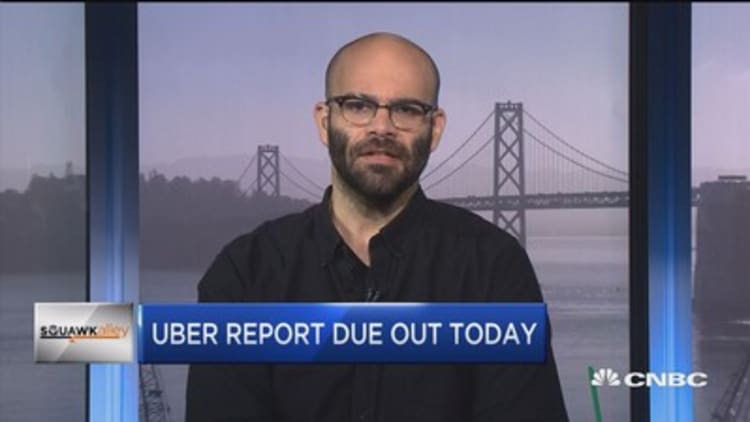
Amid fallout at Uber, at least one investor in the company thinks CEO Travis Kalanick should stay — even if he doesn't remain in charge.
"I think Travis [Kalanick] should stay at the company," Mitchell Green, founder of Lead Edge Capital, told CNBC's "Squawk Alley" on Tuesday. "I don't know if it should be in the CEO role. But he is a visionary. He has built an enormous business that is changing the way people live."
Uber is set to release on Tuesday the results of an investigation into its workplace culture, after executives were accused of failing to act on claims of sexual harassment. Reports have indicated that Kalanick might take a leave of absence after the release of the report, although a final decision has not been made.
A role creating new initiatives, heading tech products or leading artificial intelligence could also be a good fit for Kalanick, said Green, whose firm has also invested in companies like Alibaba and Spotify.
"He just lost his mother, and his father is very ill," Green said. "I wish people would also think about that."
Venture capitalist Bill Gurley, investor David Bonderman and media mogul Arianna Huffington are among those spearheading the investigation. Kalanick's top deputy, Emil Michael, announced on Monday he had left the company.
"I think Bill Gurley and David Bonderman and Arianna [Huffington] — who are on the board, leading this investigation — they are going to do the right thing," Green said. "They are big professional investors."
Kalanick has been described by other investors as a "hold-no-prisoners"- style leader. But he's not the only leader in tech who has faced criticism, Green said.
Amazon, for example, was said to be a "bruising" workplace, according to a 2015 feature in The New York Times (a descriptor Amazon disputes). Facebook's culture has been described as "cult"-like by former employee Antonio Garcia Martinez.
Still — neither company has faced the kind of concentrated scrutiny that Uber has seen in recent months.
"Unfortunately, Silicon Valley is kind of like Wall Street in the '80's and '90's ... like the 'bro culture' out there. I definitely don't condone it at all. Changes need to happen at Uber, and lots of other companies too," Green said.
He added: "Facebook is a hard-charging culture, too. Working for [Amazon CEO] Jeff Bezos is no picnic either, I think. The reason they've built the business to where it is, and ran through regulations, is because of the hard-charging culture."
Uber is in a highly competitive field, especially as companies like Apple have entered the race to build an autonomous vehicle. Uber is fighting Alphabet's Waymo in court over self-driving car technology.
But Green said that there will likely be room for more than one winner in the autonomous vehicle market, especially with companies like Apple focused on their flagship products. Green said he doesn't think any changes to Uber's valuation are particularly imminent or important.
"The performance of [Uber] remains remarkable," Green said. "We would have thought with all this PR you would have started to see some negatives, slowdowns to the business. We've seen nothing at all, which is absolutely incredible. As far as valuation, a $70 billion valuation could have been $70 [billion], it could have been $65 [billion]. It's a group of 10 to 15 investors who put a random valuation on the company. ... When we'll really find out how much it's worth is when it goes public."


